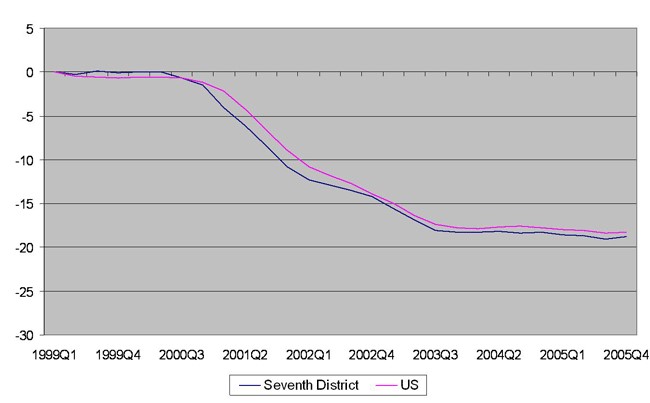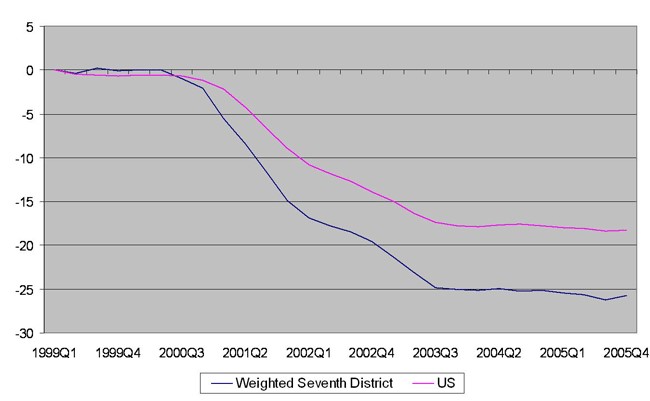Manufacturing and regional policy
The manufacturing downturn that began the current decade affected the Midwest more severely than the rest of the nation. In response to recent manufacturing decline, at least one consortium of manufacturers is now forming on a region-wide basis to share best practices and to promote manufacturing in the Midwest.
As measured by manufacturing employment, the combined declines in the Seventh District states of Illinois, Indiana, Iowa, Michigan, and Wisconsin were very sharp. The chart below shows a decline of 18.7% in the Seventh District since 1999, accounting for a net job loss of 616,900 workers in the sector. The pace of these declines was roughly in line with the national experience. However, because the region is so highly concentrated in manufacturing, the sting of manufacturing decline was sharper here. The second half of the chart below recasts manufacturing job loss in the region, weighting it proportionately by the higher concentration of manufacturing in the region versus the overall United States. In doing so, the index suggests that the impact of the actual 18.7% decline in the Midwest was similar to that of a 25.7% nationwide decline.
1. Manufacturing jobs, percent change from 1999Q1

2. Manufacturing jobs, percent change from 1999Q1 (weighted)

Manufacturing job losses may also be magnified in the Midwest to the extent that ancillary activities to manufacturing are lost, such as transportation, warehousing, and the business services purchased regionally by manufacturing companies. Estimates are that, for each $1 of manufacturing production, manufacturing companies spend another 33 cents on purchased services.
Both Midwest manufacturing output and manufacturing employment are growing once again, roughly keeping pace with the nation. However, in the Seventh District, neither recent gains in output nor employment have as yet made up for previous losses.
One response to lagging manufacturing has been the formation of a multi-state coalition of manufacturing organizations named the Great Lakes Manufacturing Council. Initiated by the Detroit Regional Chamber of Commerce, last year the group began working on a regional economic development entity to position the region to compete in the global marketplace.
Last month, the Council traveled west to Chicago to broaden the discussion and partnership among manufacturing stakeholders. Those who are interested in participating or learning more should contact Lisa Katz, Director of Government Relations at the Detroit Chamber.
3. Lisa Katz contact information

To date, the Council has identified these top priorities: 1) clarifying and promoting the region’s manufacturing image to the world and to incoming work force; 2) developing and certifying work force skills relating to manufacturing activities; 3) identifying and sharing best innovative practices and technologies among manufacturers; 4) keeping the vital U.S.–Canada border open and efficient for the flow of goods and people; and 5) articulating infrastructure needs to maintain the region’s advantage in logistics.
Are such efforts worthwhile? The results of such initiatives have been little studied. And the strategic responses of individual companies most likely overwhelm cooperative policy in ultimately determining competitive strength. However, manufacturing operations in the Midwest are tightly linked through supply linkages and through a shared labor pool and transportation infrastructure. And so perhaps the recent time of stress will spur cooperative policies that prove to be helpful in sustaining the region’s manufacturing base in the years ahead.








